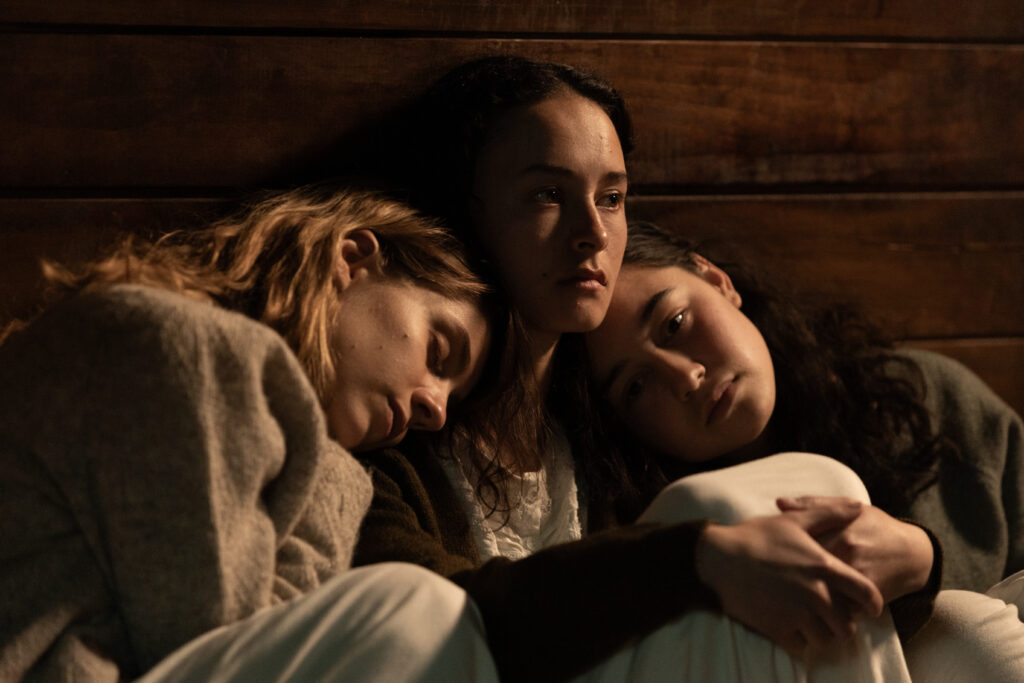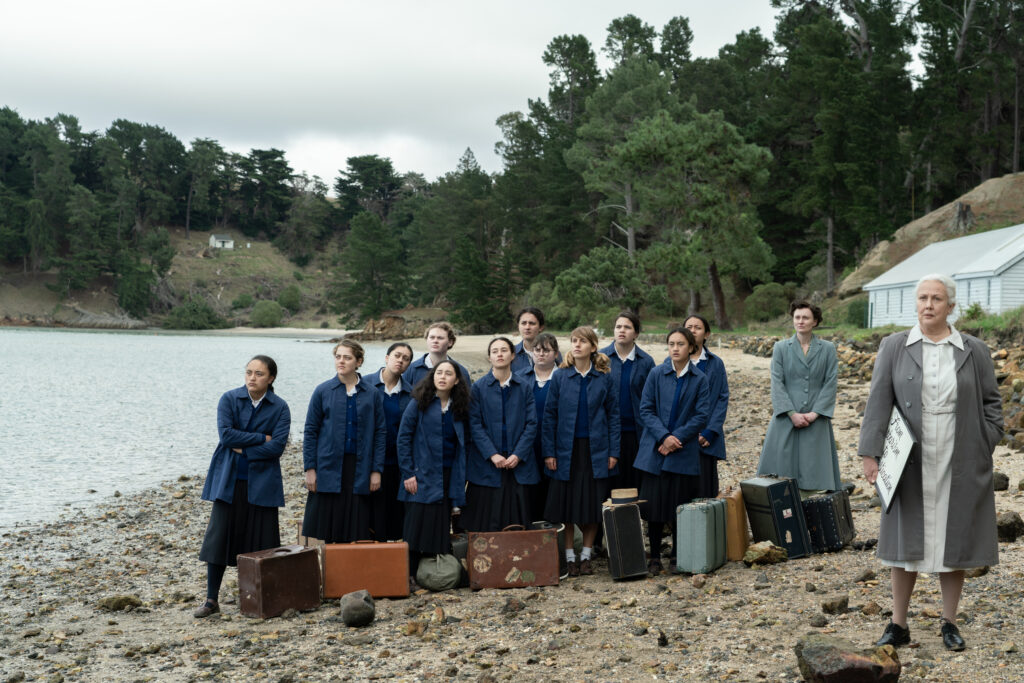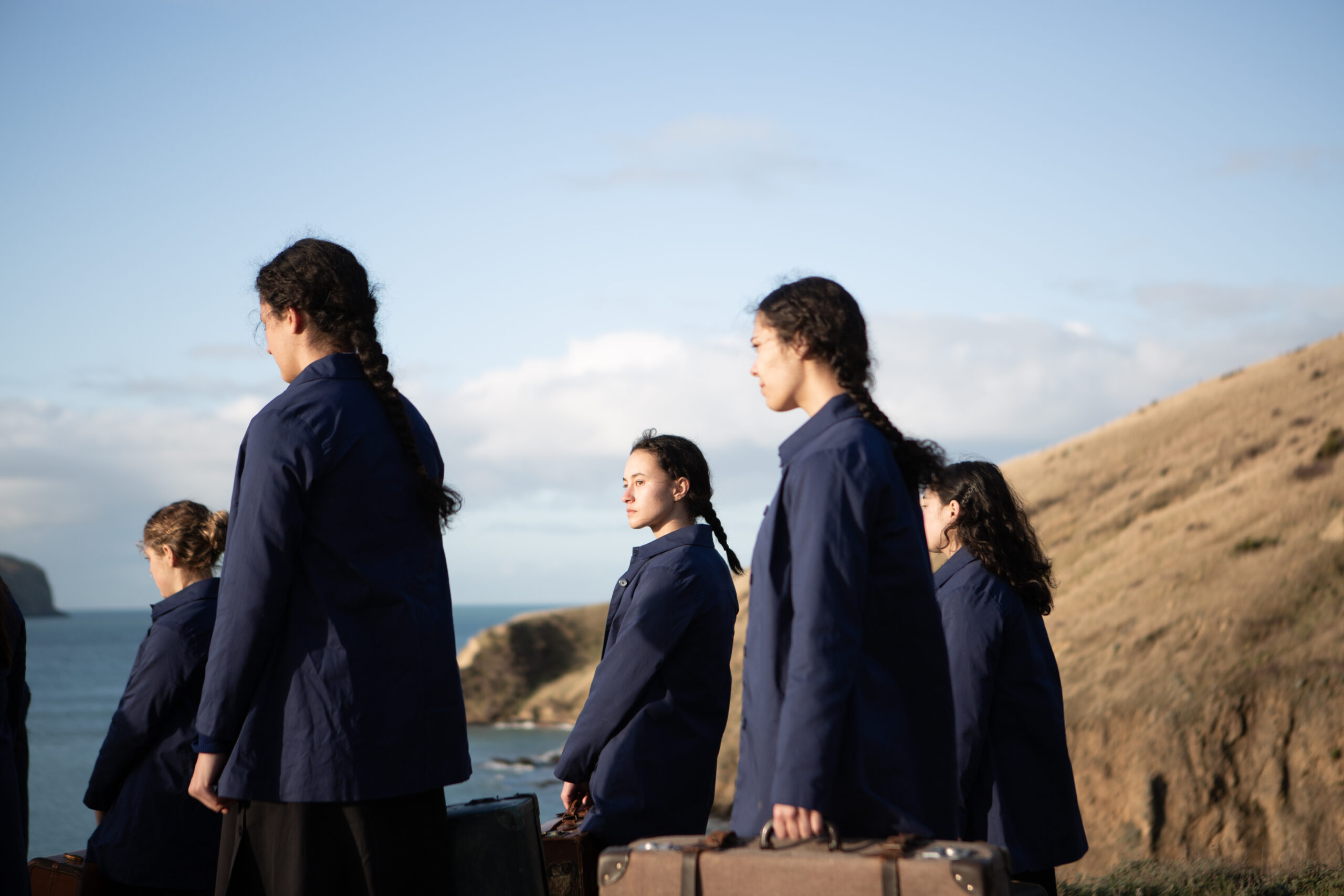Sometimes a fire needs to be set.
WE WERE DANGEROUS (2024) is a piece on girls finding support and freedom within a community of “undesirables.” Winner of the HIFF44 PASIFIKA award, this New Zealand film directed by Josephine Stewart-Te Whiu celebrates the strength of young Maori women and a wider take on girlhood.
Placed in 1954, the history of colonialism and eugenics portrayed in the film contextualizes how fear is used to control, divide, and oppress. Female sexuality is closely monitored and shamed with knowledge controlled through forced ignorance. The film visualizes the persisting violence of generational trauma and the importance of ending its cyclic nature.
Considered irredeemable, the delinquent girls of a school are expelled to an abandoned island at the fringes of civilized society. Representing an outsider identity, there is a feeling of rural safety in the natural rugged island environment. That is, until the isolation of their built community is disrupted by societal interventions that seek to regulate the girls living there.
The story follows Nellie (Erana James), Daisy (Manaia Hall), and Lou (Nathalie Morris). Nellie, the responsible yet reckless dreamer with a plan. Daisy, a runaway follower who wants to be loved and taken care of. Lou, the blonde daughter of an esteemed doctor, and a girl who most feel shouldn’t be there. For them to live peacefully, they must escape from societal machinations entirely.
Narration from The Matron (Rima Te Wiata) gives background for Nellie, Daisy, and Lou in the form of flashbacks. On their first day meeting each other, Nellie and Daisy were caught stealing by the police. For Lou, she was sent to the school after being found kissing a girl by her father. The Matron provides context to Nellie as the leader, Daisy the heart, and Lou the catalyst.

The Matron herself has a snippet of background as a girl in the same position of her charges. She is seen reacting with sudden violence to physically punish a peer. By her own standards of what makes a delinquent girl, she does not fit the societal norm of a proper woman.
As she seeks to shape and influence the girls to be proper wives and mothers, The Matron must see a bit of herself in them. During a lesson with an outside teacher brought to the island, she follows her instructions to place one hand atop the other for better image presentation when sitting. The Matron is also learning how to be accepted as civilized.
There is a duality to her oppression. When she is subdued, the girls do not take her seriously and neither do we. But at other times, The Matron’s presence grows overwhelming. She forces compliance by slapping them across the face and palms, shearing Nellie’s hair, and other public shaming. The threat of physical violence, of being woken in the dead of night and dragged from their beds for an unknown reason, keeps the girls in line.
She is a bully using violence to silence the girls, fear to control them, and ignorance to oppress. Girls like Daisy are disciplined for their lack of education and made to feel stupid, but never learn because they remain uneducated. After Nellie protests the treatment’s unfairness, she is punished for speaking out.
The Matron cares for the girls under her protection, in her own tormenting way, but is also the one allowing their hurt. When pressed on testing a new initiative of sterilizing unfit girls, she accepts and justifies the violation as necessary. Despite her best efforts to mold them into the shape of a proper lady aspiring to be a wife and mother, the girls find support, companionship, and love among each other.
The responsibility that comes with having privilege is also explored. As The Matron furiously shouts while pressing her into a wall, Lou is someone who could just pretend. Unlike the others, she could get away with hiding what makes her “undesirable.” Of all the girls, it is Lou who The Matron has the highest hopes for redeeming. She is too prejudiced against Nellie and Daisy to believe a change in heart, but Lou and the learned violence she mimics from The Matron can be accepted.
The film opens with Nellie and Daisy trying, and failing, to escape. It is only by working together within the system and making The Matron think they were divided, that the girls are able to successfully leave. Ending triumphantly on a rebellious light note, the trio sails away from the ashes of their fire.


Carley Matsumura is a Creative Media student pursuing a BA in Communications and New Media Technologies and a Certificate in Music at the University of Hawaiʻi–West Oʻahu. Her interest in storytelling originates from the community aspect of sharing a connection with others. She enjoys the way themes explored within film can be interpreted through symbolism. Carley looks forward to the possibilities of a career involving storytelling after graduation.
The HIFF ONLINE CREATIVES & CRITICS IMMERSIVE (HOCCI) program supports sustainable film criticism in Hawai’i through mentorship and paid career opportunities for Hawai’i-based AANHPI critics. The mission of HOCCI is to broaden diversity in film criticism across the Pacific and use influencer branding strategies to spark career opportunities. The 2024 HOCCI is supported by Critical Minded, a grant-making and learning initiative that supports cultural critics of color in the United States.



